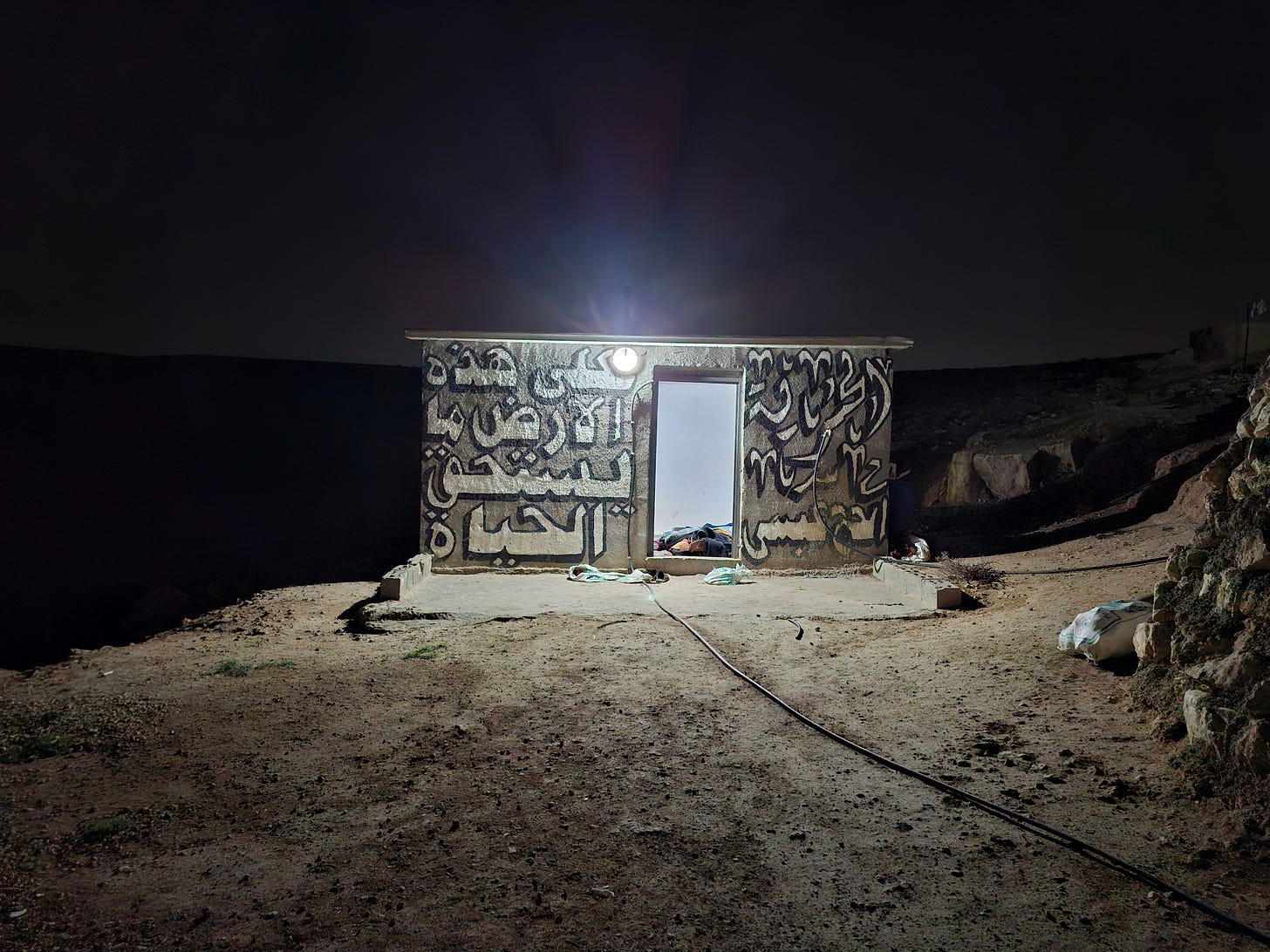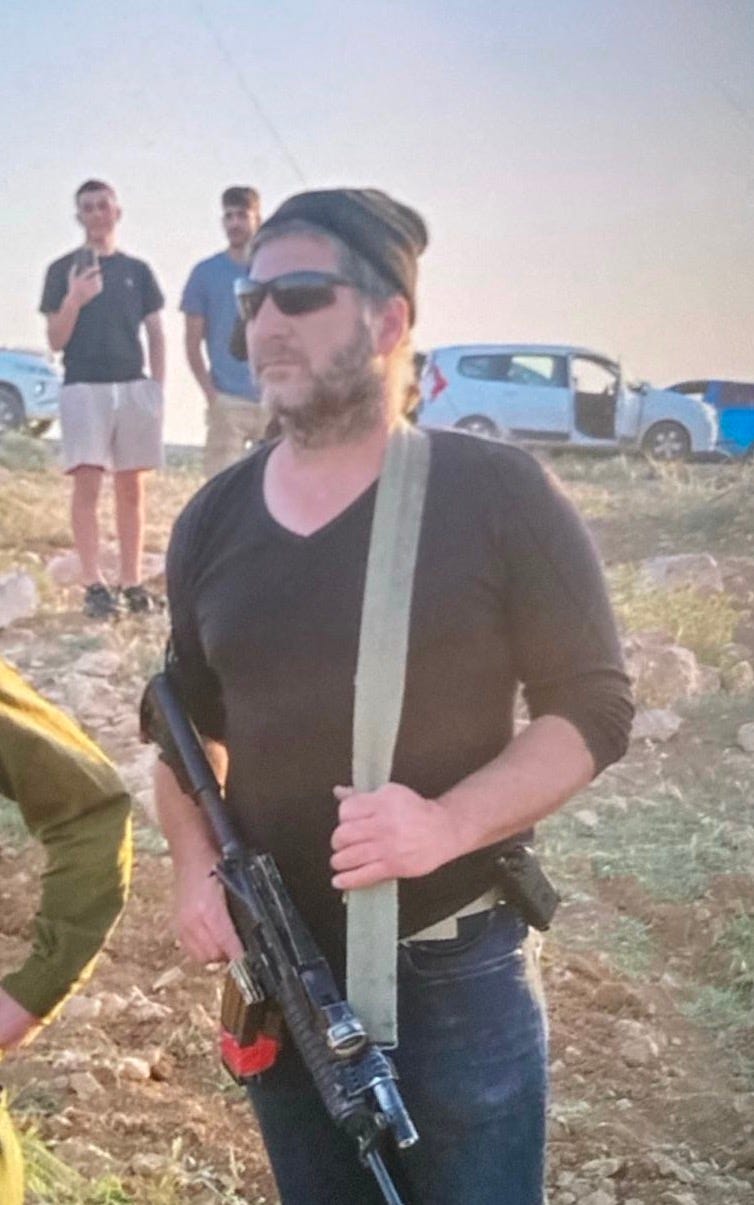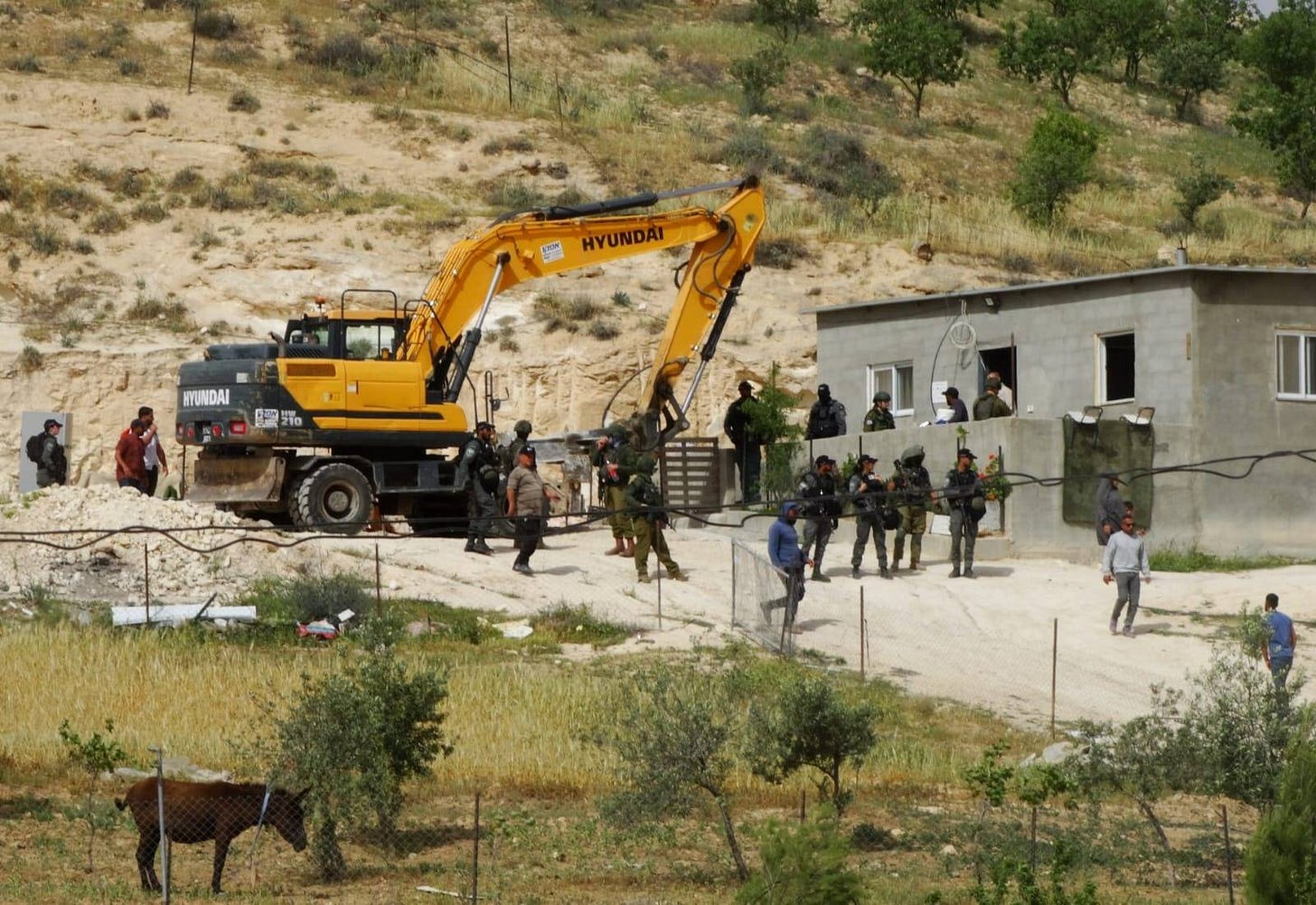Over the last nineteen months, the occupation of the Palestinian West Bank has inevitably been obscured by the apocalyptic destruction that has reduced the Gaza Strip to rubble. My friend and neighbour Shimshun (his Hebrew name) is a Jewish activist and stalwart of the Palestinian solidarity movement in Sheffield. He is also the founder of the marvellous Small Park, Big Run fundraising event supporting women’s education and children’s health and play in Palestine - a powerful and creative expression of community-to-community solidarity that I urge you to contribute to.
Shimshun has spent nearly three weeks living with Palestinian families in the rural West Bank as an activist/observer with the International Solidarity Movement (ISM) - the movement that Rachel Corrie once belonged to. The ISM is a non-violent and Palestinian-led movement, in which predominantly Western international volunteers live with Palestinian families, in order to document and observe the impact of settler-colonial violence on the Palestinian population , while also attempting to mitigate the violence through their physical presence.
I talked to Shimshun about the settler-colonial project and the resistance to it, and the daily oppression and creeping dispossession of the Palestinian population that has been going since 1967:
We were always paired up. So we would stay in a home, and any place that I stayed was always under constant encroachment and aggression from nearby settlers. There was always an atmosphere of simmering tensions. It doesn’t mean there wasn’t any play, or laughter. It’s incredible that Palestinian people manage to go about their daily lives under that sort of hostility. If I compare how we would be if we saw a band of youths coming down the road every day shouting at us, we’d have the police down. We’d be on our neighbourhood WhatsApp, and it would completely disrupt our day. If it happened for years, maybe we’d find some way of coping with it and going about our business, but I suspect that a lot of us would have moved out. We would find somewhere better to be
Was this happening because of interactions between specific settlements and villages, or was it a more coordinated movement aimed at crushing Palestinian resistance and driving the population out?
I think there’s definitely been a massive surge, after something that’s been sustained for quite a considerable period of time. The settler movement has got much more support in Israeli society, and it’s got much more backing now from state forces – the army and the police. So the settlers are emboldened because of that. They will know that they get away with things. But also on a more personal level, they will have their own particular hostility. They will want to target particular Palestinian people or particular villages.
One of the villages where Shimshun stayed was close enough to Gaza to hear the bombs falling. How had the war impacted both the settlers and the Palestinians?
I certainly feel that there’s been increased militarisation since October 7 in the West Bank. We know that that has been the case. Forensic architects have mapped that increased militarisation, especially in Jenin. The settlers feel more supported by the state, and that has emboldened them, and that makes it very important for internationals to be there, because I think it does dampen the violence. Notwithstanding that someone was shot while I was there. On the Palestinian side there is nothing but horror at what is going on in Gaza.
Did he feel that the West Bank is close to some kind of tipping point?
There are pockets of the West Bank that are at a tipping point. The Palestinian Authority (PA) plays a big role in suppressing them. In Bir Zeit university for example, when the students have demonstrated, it’s been the PA that has put them down. In Ramallah there have been demonstrations and it was the PA that put them down. So the PA is a police force that acts on behalf of the occupation. And there are, as we know, pockets of violent resistance in Nablus, in Jenin, Tulkarem – very easily put down by the Israelis, because they have such bigger and better firepower. They just clear swathes of areas, demolish homes, and get people out and arrest them.
According to Shimshun, as a consequence of Israel’s overwhelming military supremacy, many local resistance committees have chosen non-violence as a tactic, and he witnessed remarkable calm and composure under very difficult conditions. He also argues:
So it’s much more of a fragmented and localized response, which maybe takes a bigger toll on individual psyches because you don’t feel that there’s a united front to find a way out of it. Which makes it all the more remarkable that people in the real pressure areas continue to stay where they are. They are absolutely amazing, an amazing and brave people
Shim described a world of daily settler aggression, in which armed testosterone-fuelled Jewish shepherds took their sheep onto Palestinian land, and settlers were able to carry out acts of violence with complete impunity, and with the full support of the Israeli military and police. In one incident, a Palestinian farmer named Sheikh Saeed was shot by a settler, and the farmer’s son was arrested for protesting it, while the settler was allowed to go free.
To what extent were episodes like this part of an overall strategic plan?
I probably can’t comment on how settlers combine together and organize themselves. There’s just things that they probably fancy doing, but I am sure that at some level, leaders get together and say ‘oh, let’s try and make sure that we get people off this place.’ It’s quite obvious that there is a settler leadership which has connections with the government, and some of them are in the government. And I imagine that some of the coordination about seizing infrastructure or coordination to do with house demolitions will be done at that sort of strategic level.
Shim also observed how Palestinians attempted to resist and survive, within their limited means:
The most important resistance that I saw was Palestinians continuing to be there. They went about their lives as they normally did, day in, day out. So they would take their sheep out, they would go and harvest their fields, and they would combine together to give each other mutual aid and support. And also they coordinated with internationals in their area, to make sure they received the right support in the right places when they were under pressure. The most important resistance from their point of view was carrying on being there. That is going to be the most annoying thing for the settler movement. I never once saw any violent reaction from Palestinian people, under the most incredible provocation.
In a Western world that too easily equates ‘Palestinian’ with ‘terrorist’, this practice of sumud - steadfastness - tends to be as marginalized as the violence that inspires it. Shim entitled a talk on his experiences in the West Bank ‘terror and beauty.’ I asked him what explained that formulation:
Well, the terror was in front of your face. It’s a terrorised society. You’ve got about three quarters of a million settlers, all armed. Many of them have M16s. The only way you get M16s is through the government or because you’re a soldier. Others have small weapons, and young boys with weapons fuelled with testosterone – they’re just dangerous. It’s not a situation you’d want to be in, so you’re terrified. You’re terrified for your family and for yourself, and constantly people are shot. So that is the terror. But the beauty is – well the land is beautiful. And it just should be a place that enriches Palestinian people. And people like you and me should be going there and enjoying that and having the fantastic welcome that I had, and helping Bedouin people have a reasonable standard of living. So the land is beautiful, and -it sort of sounds a bit corny and I don’t want to romanticise it - the people were really, really beautiful as well. I can’t emphasize enough how generous they were and how kind they were, and there’s something about the spirit with which they go about their daily lives that was also very beautiful to watch.
Didn’t this idea that the Palestinians are a terrorized people fly in the face of many decades of Israeli propaganda?
Yes of course. It’s a counter-narrative. It’s completely the opposite of what we’re generally taught.
How did Palestinians respond to Shim’s Jewishness?
The three times I mentioned this, it didn’t matter. I made the decision that I wasn’t particularly going to offer it out, because I would have been offering a conversation that was far too much about me. And I wasn’t there to say that I was Jewish. But they are so well aware that there are Jewish people, and especially Israelis that support them.
At the village of Al Tiwani, Shim met a group of young Israeli activists who particularly impressed him:
There was one young woman who was phenomenal: angry, serious, really, really organized. She understood the complexities and contradictions in her life and was tormented by them at some level. She felt that her life had just been ripped away from her because of what’s been happening. It’s like everybody else – she wants to go and live her life and have a nice time, but she has taken on her shoulders, the responsibility of what her society has done, and all those people in that Israeli group have done that and they are beyond measure, fantastic.
Such activists tend to be ignored in the persistent equation between Palestinian solidarity and antisemitism. Western governments have often made statements condemning the settlement movement, but no serious pressure has ever been exerted to halt or reverse it. To what extent did Shim believe that these were ignorant of what is taking place in the West Bank or complicit in it?
They definitely know what’s going on, and they are definitely complicit. For example, in the last three months of 2024 the value of U.K. government-approved licenses for arms exports to Israel were worth more than in all period 2020-2023. The very, very least that these governments should be doing is having a complete weapons embargo with Israel and abandoning all trade with Israel. That’s the very minimum that they should be doing, not just because of Gaza but because of the occupation of the West Bank.
The Oscar-winning film No Other Land and Louis Theroux’s recent documentary The Settlers have revealed - to many viewers for the first time - the violence, fanaticism and criminality of the settler-movement acting with the support and collusion of the Israeli state. Shim believes that these efforts have contributed to a ‘change of narrative’ about the occupation in the last few weeks, which he has observed in some of the more supportive responses to pro-Palestinian protests in Sheffield.
If true, this transformation may have come too late to save Gaza, and it remains to be seen whether it can help the besieged Palestinians of the West Bank. Shim believes that the emboldened settler movement is ultimately seeking to drive rural Palestinians into cities, where they would form policed ghettoes within an annexed ‘Judea and Samaria.’
The main obstacles to this outcome are the courage and resilience of the Palestinians themselves, and also the solidarity that my neighbour and the ISM have shown, that goes beyond borders in order to bear witness to the horrors of an occupation that too many governments have preferred to ignore.







Whilst there are some extraordinarily brave activists in Israel, I now find hard to believe that the overwhelming majority of Israelis are not now wholly complicit in what is happening. The state and military actively so, along with the settler/colonialist militias, armed and supported by the military. As ever, those who are silent are just as complicit.
It is of little consolation that traditional allies of Israel are at last starting to speak up, and journalists who have tried to be a balanced as possible are increasingly making their views clear. Jeremy Bowen's recent article is excellent. Channel 4 news has clearly lost patience with Israeli spokespersons. Fed up with what is so often blatant lying in the face of clear evidence.
The immense damage to Israel's reputation is permanent. Their repeated accusations of anti-semitism to deflect any criticism of blatant war crimes by Israel has deeply offended those who traditionally would be the first to call out real anti-semitism. Crying wolf does not end well.